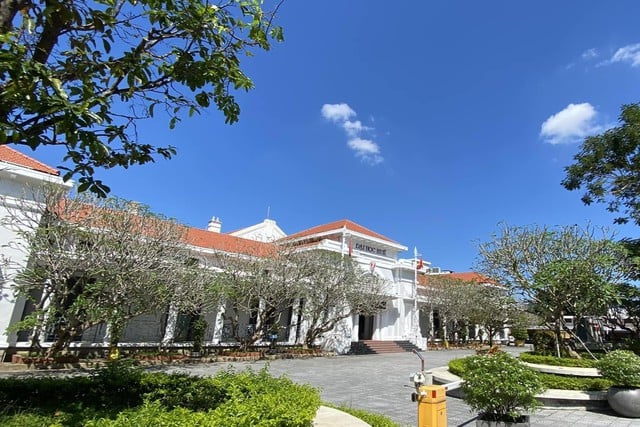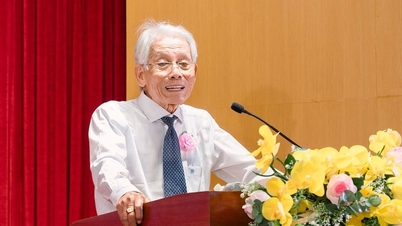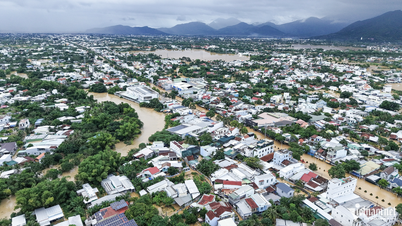
Campus of Van Lang University in Ho Chi Minh City, a new school included in the ranking of the world's most sustainable universities
PHOTO: VAN LANG UNIVERSITY
Many leaps
Quacquarelli Symonds (QS) in the UK announced the rankings of the world's most sustainable universities in 2026 on November 18. Vietnam has 12 ranked universities, including two new representatives: Van Lang University (VLU, ranked 781) and Ho Chi Minh City University of Technology (HUTECH, ranked 1,501+). Meanwhile, Hanoi National University (VNU) dropped 49 places to 374th, but still holds the No. 1 position.
Sharing the same downward trend are Ho Chi Minh City University of Economics (UEH, from 653 to 658), Hanoi University of Science and Technology (HUST, from 702 to 709), Ho Chi Minh City National University (VNUHCM, from 880 to 999) and Nguyen Tat Thanh University (NTTU, from 1,451-1,500 to group 1,501+).
On the contrary, many other units have made a leap in rankings, such as Hue University (HU) which increased more than 700 places from the 1,501+ group to 768th place, or Ton Duc Thang University (TDTU) which jumped more than 360 places to 553rd place, ranking 3rd in Vietnam. Some schools also increased their rankings, such as Duy Tan University (DTU, increased 48 places to 490th place) and Can Tho University (CTU, increased 150 places to 910th place). Meanwhile, Danang University still maintained its ranking in the 1,501+ group.
Overall, this year Vietnam has 9 schools in the top 1,000 sustainable development universities, 3 more than last year. Most of these are public schools and 7/9 are universities, only 2 are universities. The ranked units are also spread across 3 regions, not concentrated in 2 big cities, Hanoi and Ho Chi Minh City, reflecting the diverse picture of university education.
Of the 12 Vietnamese schools ranked, nine are in the top 1,000, with scores based on QS criteria ranging from 52.4 (VNUHCM) to 74.1 (VNU).
Specifically, in the environmental impact criteria group, Vietnamese universities achieved the best scores in the environmental research criteria (ranging from 62.3 to 88.5), while in the two criteria of environmental education and sustainable environmental development, no university achieved a score exceeding 71 (ranging from 28.5 to 70.8 and 13.7 to 66). In the governance criteria group, universities were evaluated from 29.1 to 90.5 points.

Hue University, the school that just made a leap in the new QS rankings
PHOTO: HUE UNIVERSITY
In the last group of criteria, social impact , schools achieved equal results in the knowledge sharing criterion, ranging from 73.8 to 91.1 points. The criteria of equality; recruitment and opportunity; health and well-being were respectively assessed from 52.1 to 87.8; 46.5 to 80.8, 45.2 to 82.9. In the criterion of impact on education, schools had quite low scores, ranging from 30 to 56.8 points.
Overall, the positive point is that most of the floor and ceiling levels of the criteria are higher than last year, showing the overall growth of the units in the ranking of the world's most sustainable universities.
How is the university ranking done?
The World University Sustainability Rankings evaluate universities according to three main criteria, divided into nine sub-criteria. Each sub-criteria is also divided into many assessment aspects, with a total of 53 aspects. The weight of these aspects is mostly 1%, but there are two aspects that reach 9% (research impact on sustainable development goals) and 10% (academic reputation in the field of earth and environmental sciences).
“The publication of the sustainability rankings comes at a pivotal time. With only 17% of the United Nations’ 169 global Sustainable Development Goals (SDGs) on track to be achieved by 2030, the need for urgent action on environmental and social challenges has never been clearer,” said Ben Sowter, Senior Vice President of QS.
This year, QS ranked more than 2,000 higher education institutions from 106 countries and territories around the world. The top spot is Lund University (Sweden), the only university to achieve a perfect score of 100, taking over from the University of Toronto (Canada), which is now only in second place. Following are the universities: UCL (UK) ranked 3rd, Edinburgh (UK) ranked 4th and British Columbia (Canada) ranked 5th. In terms of quantity, the US is the country with the most ranked institutions with 240 schools.
QS is one of the most prestigious, experienced and influential university ranking organizations in the world, along with THE (UK) and Shanghai Ranking Consultancy (China). QS has been ranking universities since 2004 with THE, one year after the world first had a global university ranking published by Shanghai Jiao Tong University (later Shanghai Ranking Consultancy).
Source: https://thanhnien.vn/12-truong-viet-vao-bang-xep-hang-dh-phat-trien-ben-vung-nhat-the-gioi-185251119101922356.htm


![[Photo] General Secretary To Lam receives Slovakian Deputy Prime Minister and Minister of Defense Robert Kalinak](https://vphoto.vietnam.vn/thumb/1200x675/vietnam/resource/IMAGE/2025/11/18/1763467091441_a1-bnd-8261-6981-jpg.webp)


![[Photo] Prime Minister Pham Minh Chinh and his wife meet the Vietnamese community in Algeria](https://vphoto.vietnam.vn/thumb/1200x675/vietnam/resource/IMAGE/2025/11/19/1763510299099_1763510015166-jpg.webp)









































































































Comment (0)